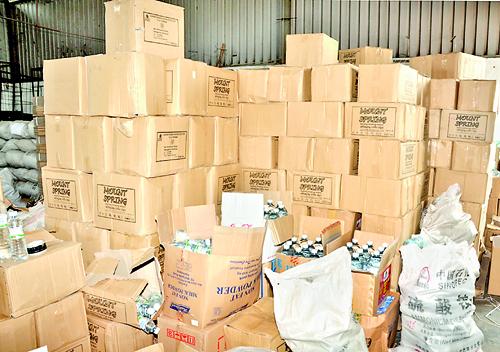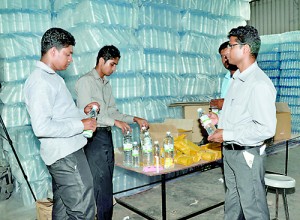News
Natural, clean bottled water – no it’s not, raid shows
This week’s seizure of 37,000 bottles of water contaminated with a chemical similar to kerosene oil has raised concerns over the safety and purity of bottled water.
Following complaints of a strong chemical stench similar to kerosene, Consumer Affairs Authority on Tuesday raided the Dalugama, Kelaniya factory of Mount Spring Water (Pvt.) Ltd, an associated company of DSI Samson Group.

The recent raid at Dalugama, Kelaniya factory of Mount Spring Water (Pvt.) Ltd. Pic by Lal S. Kumara
The Kadawatha Courts on Wednesday fined the company Rs.100,000 and the bottles were destroyed under the supervision of court officials.
“We received complaints from hotels, food outlets and supermarkets who have purchased bottles from the factory. Some even said they have received complaints of people feeling vomitish after consuming the water,” said the Chief Raid officer of Gampaha district, Ranjith Weerawardena.
Inspection of the factory turned up three batches of plastic bottles emanating the chemical stench and the water having a strange chemical flavour. Out of this, 37,000 bottles contained water and 500,000 were empty plastic bottles.
Mr. Weerawardena said a chemical used during the manufacturing of bottles, had resulted in the water being contaminated. Out of the seized bottles 25,000 were 500ml and 12,000 were one-litre bottles.
The Trade Ministry has ordered the removal of 25,000 bottles from the market.
“It is unfortunate that despite having both the safety certifications from the Health Ministry and the Sri Lanka Standards Institute (SLSI), continuous quality checks on bottles has not taken place. The samples were sent for further analysis,” Mr Weerawardena added.
According to the Health Ministry, “bottled drinking water” and “bottled natural mineral water” must have two ministry safety certifications: CFA/BW/00/0000-00 is issued for “bottled drinking water” and CFA/NMW/00/0000-00 for bottled natural mineral water.
 The SLSI too gives the standard certifications SLS 894 for bottled drinking water and SLS 1038 for bottled natural mineral water. The label should indicate the Health Ministry registration number, the SLS certification, date of manufacture and expiry as well as the water source. The registration also needs to be renewed every three years.
The SLSI too gives the standard certifications SLS 894 for bottled drinking water and SLS 1038 for bottled natural mineral water. The label should indicate the Health Ministry registration number, the SLS certification, date of manufacture and expiry as well as the water source. The registration also needs to be renewed every three years.
The bottle that holds the water needs to be continuously checked for quality, said Dr. Waruna Gunetillake, Head of the National Hospital’s Poison Centre.
“Bottled water is manufactured for only one use, and adding tapwater can result in chemical reactions which over time become carcinogenic. Similarly, it should not be exposed to sunlight. This is why the World Health Organisation also does not recommend bottled water for infants,” said Dr. Gunetillake.
He said the surest way of having safe drinking water is to boil water to 100 degrees.
Sri Lanka has more than 70 registered bottled water brands.
“The bottled water industry needs a continuous monitoring mechanism. Unfortunately, from the groundwater extraction to the sealing of the bottled water, it has to be continuously monitored – this includes the quality of plastic,” said Water Supply and Drainage Minister Dinesh Gunewardena.
He said that although the Ministry and the Water Supply and Drainage Board had the highest number of experts in the water sector, they did not have any legal power or regulation to check or monitor the bottle water industry or mechanism.

